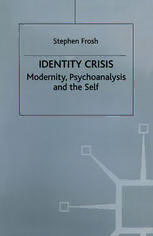Table Of ContentIdentity Crisis
Also by Stephen Frosh
The Politics of Psychoanalysis
Psychoanalysis and Psychology
Child Se:~n~al Abuse (with D. Glaser)
The Politics of Mental Health (with R. Banton, P. Clifford,]. Lousada and
]. Rosenthall)
Identity Crisis
Modernity, Psychoanalysis and the Self
STEPHEN FROSH
* © Stephen Frosh 1991
All rights reserved. No reproduction, copy or transmission of
this publication may be made without written permission.
No paragraph of this publication may be reproduced, copied or
transmitted save with written permission or in accordance with
the provisions of the Copyright, Designs and Patents Act 1988,
or under the terms of any licence permitting limited copying
issued by the Copyright Licensing Agency, 90 Totten ham Court
Road, London W1T 4LP.
Any person who does any unauthorised act in relation to this
publication may be liable to criminal prosecution and civil
claims for damages.
The author has asserted his right to be identified
as the author of this work in accordance with the
Copyright, Designs and Patents Act 1988.
Published by
PALGRAVE MACMILLAN
Houndmills, Basingstoke, Hampshire RG21 6XS and
175 Fifth Avenue, New York, N.Y. 10010
Companies and representatives throughout the world
PALGRAVE MACMILLAN is the global academic imprint of the Palgrave
Macmillan division of St. Martin's Press, LLC and of Palgrave Macmillan Ltd.
Macmillan® is a registered trademark in the United States, United Kingdom
and other countries. Palgrave is a registered trademark in the European
Union and other countries.
ISBN 978-0-333-51107-7 ISBN 978-1-349-21534-8 (eBook)
DOI 10.1007/978-1-349-21534-8
This book is printed on paper suitable for recycling and
made from fully managed and sustained forest sources.
A catalogue record for this book is available from the British Library.
To my parents
Contents
Acknowledgements
lX
Introduction 1
The Modern Mind 6
Modernity, Narcissism and Psychosis 7
1 Social Ezperience 10
Modern Times 14
Postmodern States of Mind 21
2 Freud's Monster 32
The Dam Metaphor 33
Nature and Unconscious Passion 40
Affirmative Relations 42
Bad World, Mad World 49
Postmodern Psychosis 53
3 Narcissism 63
The Culture of Narcissism 63
Subject and Object 68
Narcissistic Pathology 73
Lost Illusions 78
The Ego Ideal 81
The Real Father 87
4 Narcissistic Pathology 95
Narcissism and Society 95
Selfobjects and Mirrors. 101
The Raging Self 106
Broken Mirrors 113
Transference and Change 119
Vll
Vlll Contents
5 Dreaming of Madness 126
The Habit of Belief 126
The Influencing Machine 128
Schizoanalysis 137
The Madness of Self and Society 146
6 Psychotic States of Mind 152
Recuperating Reality 152
Signifying Nothing 159
Inside and Out 163
Annihilatory Pieces 17 2
Postmodernism, Concrete Consumption and Reverie 179
Conclusion: The Crisis of Identity 187
Identity Crisis 187
Reverie and Resistance 191
References 196
Index 202
Acknowledgements
Earlier and shorter versions of the chapters of this book have
appeared in Free Associations, vol. 16, pp. 7-30 (1989), Free
Associations, vol. 18, pp. 22-48 (1989) and in Human Relations
( 1990).
I would like to thank Daniel Miller for freely sharing some
very productive ideas.
STEPHEN FROSH
lX
Introduction
Psychoanalysis has never had more to say about contemporary
culture than it has now. On the whole, however, it is not
psychoanalysts who are saying it. The tradition of Freud's
Civilisation and its Discontents has been taken up more by literary
and cultural critics, by feminists and political theorists, than it
has by psychoanalysts or psychologists. That tradition, of
sweeping, poetic cultural criticism and analysis, thrives mainly
on the fringes of psychoanalytic theory - amongst those who
are not primarily clinicians, but who are concerned with
making sense of the modern world and who feel the need for
a compelling theory of subjectivity to help them on their way.
For something unexpected has happened in the social and
political sciences, due in part at least to the advent of a body of
sophisticated feminist theory. Politics has truly become
personal; some might say, it has become so personal as to no
longer be political. It is ideology which is now at the forefront
of critical consciousness: how ideas, personal meanings and
interpersonal relationships determine our experience and
interpretation of the world, reproducing or subverting existing
sets of power relations. Analysis of economic and structural
features of society has given way to a hugely entertaining and
occasionally illuminating 'discourse' on how the human subject
- the experiencing 'I' of all our lives - is constructed in the
midst of the flow and contradiction of social events. How, that
is, we reflect in our own individual experience the dominating
characteristics of the contemporary social environment.
Understanding and interpreting this experience requires a
language and set of concepts which are finely attuned to the
nuances of subjectivity. In particular, it demands a language
able to grapple with psychological phenomena which are more
extensive than those of consciously willed acts, a language that
can reveal the unappreciated connections between what we
experience and what it is we are. A language, therefore, of the

